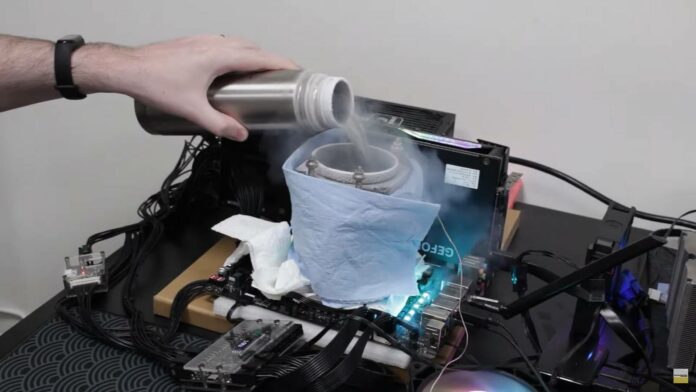An overclocked Ryzen 7 9700X has claimed first place in OCCT AVX tests. Using a 6.3GHz clock, possible thanks to extreme cooling, AMD’s midrange chip managed to muster just enough power to surpass Intel’s best CPU.
Overclocker SkatterBencher beat Intel’s Core i9-14900KF in the OCCT single-threaded AVX test using AMD’s Ryzen 7 9700X CPU. With a score of 263.03, Team Red’s chip topped the charts globally, ahead of the former champ’s 255.42 points.
Usually, AMD Ryzen 7 9700X tops out at a 5.5GHz boost clock out of the box, but SkatterBencher teased this all the way to 6.3GHz using liquid nitrogen to cool the processor. By comparison, Core i9 ran at a lofty 7.1GHz frequency. It’s not a sustainable way to run any chip, but it does showcase the amount of untapped potential Zen 5 has through overclocking with the right cooling and power.
Never resting on their laurels, the overclocker also claimed second place in both AVX and the SSE test using regular liquid cooling. It’s important to note that SkatterBencher used AMD’s Precision Boost Overdrive (PBO) for this overclock. PBO is generally avoided due to its dynamic nature, as overclockers prefer a more predictable setting. Nevertheless, with enough time, great things can be done.
As SkatterBencher clearly states, these are merely for testing and record-breaking purposes. Even using extreme cooling methods, these frequencies remain mostly unstable, let alone usable on a daily basis. Still, it’s a testament to AMD’s continued support of AVX instructions at a time when Intel removed AVX512 from its recent consumer chips. To be fair, unless you do data analytics, cryptography, emulation, or any task that specifically calls for AVX instructions, its absence shouldn’t bother you.
With each passing generation, transistors become smaller and faster, so we may reach such frequencies in the future on regular air/liquid cooling.
